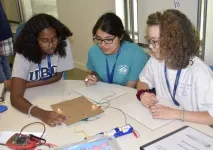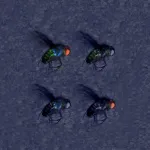(Press-News.org) Scientists at Walter Reed Army Institute of Research, in a collaboration with Duke University, have confirmed that monoclonal antibodies can be an effective tool in the global fight against malaria.
The study, led by Dr. Sheetij Dutta, chief of the Structural Vaccinology Laboratory at WRAIR, showed that mAbs such as CIS43 were most effective in a culture-based assay that measured malaria parasites' ability to infect a human liver cell, while another mAb 317 showed the best activity in a mouse infection model. Dutta added "difference in assay outcomes for mAbs could reflect distinct sites on the circumsporozoite protein that can be exploited for developing improved vaccines." The study results were published today in Nature Scientific Reports.
Despite decades malaria vaccine research, current vaccine candidates have shown low efficacy in field trials conducted in several countries in Africa. Many researchers from around the world have now focused their attention on using monoclonal antibodies against the circumsporozoite protein of the parasite.
Unlike vaccines, where protective responses can take multiple doses and many months to develop, mAbs may offer months of protection immediately after administration of a single injectable dose and can be developed at a fraction of the cost of developing new drugs.
Army Col. Jason Regules, MD, director of WRAIR's Malaria Biologics Branch, added, "this was a critical study and will help to guide our future work in isolating monoclonal antibodies of unique specificity and activity from ongoing clinical trials of the FMP013 and FMP014 malaria vaccines that were developed at the WRAIR, in collaboration with our malaria research partners."
Malaria, spread by infectious mosquitoes, causes over 200 million cases and kills hundreds of thousands of people every year, with a disproportionate allocation of morbidity and mortality distributed amongst children and pregnant women living in the most impoverished and resource-limited areas of the world. Malaria-naïve travelers to malaria-endemic regions must employ anti-malarial countermeasures or also be at risk of grave illness or death. The armamentarium against malaria is limited. Anti-malarial drug effectiveness, a cornerstone for prevention and treatment, can be sub-optimal due to ever-emerging resistance, the need for frequent administration, and difficulties with compliance. The WRAIR's Malaria Biologics Branch has well-established capability to rigorously testing malaria vaccines and antibody-based products including human trials involving exposure to malaria infection.
The work was performed as part of a collaboration between Dr. Sheetij Dutta, Malaria Biologics Branch, WRAIR, Dr. Georgia Tomaras, Duke University, and Dr. Gordon Joyce of the Emerging Infectious Disease Branch, WRAIR.
About the Walter Reed Army Institute of Research
Headquartered in Silver Spring, Maryland, the Walter Reed Army Institute of Research is the oldest and most mission-diverse biomedical research laboratory in the Department of Defense. WRAIR provides unique research capabilities and innovative solutions to a range of force health and readiness challenges currently facing U.S. Service Members, along with threats anticipated during future operations. With research units in the state of Washington, Africa, Asia and the Caucasus region, WRAIR houses three centers, the Center for Infectious Disease Research, the Center for Military Psychiatry and Neuroscience and the Center for Enabling Capabilities.
WRAIR, Duke scientists find evidence of monoclonal antibodies activity against malaria
2021-03-05
ELSE PRESS RELEASES FROM THIS DATE:
Physics camp has proven benefits for high school girls
2021-03-05
HOUSTON - (March 5, 2021) - Even a small effort up front can boost the abilities and confidence of girls as they anticipate taking challenging science courses.
A long-running summer program at Rice University and elsewhere that trains high school girls in basic physics concepts has proven successful in helping them thrive when they take on full courses the next year.
When leaders of Rice's two-week day camp looked at similar programs beyond Houston, they found participants scored 3% better in high school physics than their counterparts who did not have the equivalent summer experience.
"That doesn't seem like a lot, but it's really hard to move the needle on student outcomes, so 3% is significant," said Carolyn Nichol, an assistant ...
With unfair police treatment, the tragedy is not limited to the incident itself
2021-03-05
BUFFALO, N.Y. - New research using a nationally representative sample of more than 12,000 participants shows the collateral consequences victims are likely to confront following unfair treatment by police.
Michael Brown, George Floyd and Tamir Rice are just some of those who have died recently at the hands of police.
Their names are now tragically familiar, but thousands of other people who are unjustly stopped, searched or questioned by law enforcement will likely experience a range of detrimental outcomes associated with unfair police treatment, including depression, suicidal thoughts, drug use, and a loss of self-efficacy, according to Christopher ...
Building networks not enough to expand rural broadband
2021-03-05
ITHACA, N.Y. - Public grants to build rural broadband networks may not be sufficient to close the digital divide, new Cornell University research finds.
High operations and maintenance costs and low population density in some rural areas result in prohibitively high service fees - even for a subscriber-owned cooperative structured to prioritize member needs over profits, the analysis found.
Decades ago, cooperatives were key to the expansion of electric and telephone service to underserved rural areas, spurred by New Deal legislation providing low-interest government grants and loans. Public funding for rural ...
Rapid 3D printing method moves toward 3D-printed organs
2021-03-05
BUFFALO, N.Y. -- It looks like science fiction: A machine dips into a shallow vat of translucent yellow goo and pulls out what becomes a life-sized hand.
But the seven-second video, which is sped-up from 19 minutes, is real.
The hand, which would take six hours to create using conventional 3D printing methods, demonstrates what University at Buffalo engineers say is progress toward 3D-printed human tissue and organs -- biotechnology that could eventually save countless lives lost due to the shortage of donor organs.
"The technology we've developed is 10-50 times faster than the industry standard, and it works with large ...
Online dating: Super effective, or just... superficial?
2021-03-05
According to the Pew Research Center, 1 in 10 American adults have landed a long-term relationship from an online dating app, such as Tinder, OKCupid and Match.com. But what compels people to "swipe right" on certain profiles and reject others?
New research from William Chopik, an associate professor in the Michigan State University Department of Psychology, and Dr. David Johnson from the University of Maryland, finds that people's reason for swiping right is based primarily on attractiveness and the race of a potential partner, and that decisions are often made in less than a second.
"Despite online dating becoming an increasingly popular way for people to meet one another, ...
New 'split-drive' system puts scientists in the (gene) driver seat
2021-03-05
Powerful new genetic engineering methods have given scientists the potential to revolutionize several sectors of global urgency.
So-called gene drives, which leverage CRISPR technology to influence genetic inheritance, carry the promise of rapidly spreading specific genetic traits throughout populations of a given species. Gene-drive technologies applied in insects, for example, are being designed to halt the spread of devastating diseases such as malaria and dengue by preventing mosquito hosts from becoming infected. In agricultural fields, gene-drives are being developed to help control or eliminate economically ...
Survey identifies factors in reducing clinical research coordinator turnover
2021-03-05
Strong, collaborative relationships with principal investigators are a key factor of longevity in clinical research coordinator positions -- an essential, but increasingly transient job in executing treatment-advancing clinical trials, Vanderbilt University Medical Center researchers found.
Danielle Buchanan, BS, clinical translational research coordinator III in the Department of Neurology, and Daniel Claassen, MD, MS, chief of the Division of Cognitive Disorders and associate professor of Neurology, found the top factor for retention is a close working relationship between clinical research coordinators (CRCs) and the study's principal investigator that emphasizes respect and collaboration. Salary followed as the next factor for retention among 85 former or current CRCs who responded to ...
Study reveals how egg cells get so big
2021-03-05
Egg cells are by far the largest cells produced by most organisms. In humans, they are several times larger than a typical body cell and about 10,000 times larger than sperm cells.
There's a reason why egg cells, or oocytes, are so big: They need to accumulate enough nutrients to support a growing embryo after fertilization, plus mitochondria to power all of that growth. However, biologists don't yet understand the full picture of how egg cells become so large.
A new study in fruit flies, by a team of MIT biologists and mathematicians, reveals that the process through which the oocyte ...
Vision impairment is associated with mortality
2021-03-05
The global population is aging, and so are their eyes. In fact, the number of people with vision impairment and blindness is expected to more than double over the next 30 years. ...
WRAIR, Duke scientists identify of monoclonal antibodies efficacy against malaria
2021-03-05
Scientists at Walter Reed Army Institute of Research, in a collaboration the Duke University, have confirmed that monoclonal antibodies can be an effective tool in the global fight against malaria.
The study, led by Dr. Sheetij Dutta, chief of the Structural Vaccinology Laboratory at WRAIR, showed that mAbs such as CIS43 were most effective in a culture-based assay that measured a malaria parasite's ability to infect a human liver cell, while another mAb 317 showed the best activity in a mouse infection model. Dutta added, "difference in assay outcomes for mAbs could reflect distinct sites on the circumsporozoite protein, that can be exploited for developing improved vaccines." The study results were published today in in Nature Scientific Reports.
Despite decades ...




